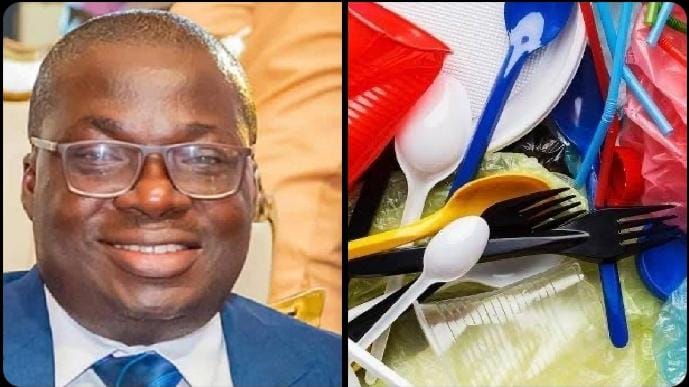The Ekiti State House of Assembly is forging ahead with a groundbreaking bill to ban single-use plastics across the state. This initiative, which has already passed its first reading, signals a bold step toward addressing the growing menace of plastic pollution, a pressing issue that has contributed to flooding, clogged waterways, and environmental hazards in the region. The announcement, made by Speaker Adeoye Aribasoye during a pre-legislative stakeholders’ workshop in Ado-Ekiti, has sparked widespread discussion and garnered support from a diverse coalition of stakeholders, including environmentalists, market women, artisans, and hospitality industry leaders.
A Growing Environmental Crisis
Single-use plastics—items like plastic bags, straws, cutlery, and packaging designed for one-time use—have become a global environmental scourge. In Ekiti State, these non-biodegradable materials have been identified as a significant contributor to blocked drainage systems, exacerbating flooding during the rainy season and posing health risks to communities. The accumulation of plastic waste in rivers, streets, and farmlands not only mars the state’s natural beauty but also threatens biodiversity and public health. Recognizing the urgency of the situation, the Ekiti State House of Assembly is prioritizing the swift passage of this bill to curb the proliferation of single-use plastics and set a precedent for sustainable waste management in Nigeria.
The bill’s introduction comes at a critical time. Nigeria generates an estimated 2.5 million metric tons of plastic waste annually, much of which ends up in landfills, waterways, or incinerators, releasing toxic pollutants into the air and soil. In Ekiti, a largely agrarian state known for its lush landscapes and cultural heritage, the unchecked spread of plastic waste has raised alarms among policymakers and residents alike. The proposed ban aims to address these challenges head-on, aligning with global efforts to reduce plastic pollution and promote a circular economy.
A Collaborative Effort for Change
The push for the single-use plastics ban gained momentum during a pre-legislative stakeholders’ workshop organized by the Triple Green Environmental Development (TGED) Foundation in collaboration with the Assembly’s Committee on Environment. The event brought together a cross-section of society, including market women, artisans, hoteliers, environmental experts, and community leaders, to discuss the bill’s implications and chart a path forward. The workshop served as a platform for robust dialogue, with participants emphasizing the need for sustainable alternatives to single-use plastics and innovative waste management solutions.
Speaker Aribasoye, addressing attendees, underscored the Assembly’s commitment to environmental stewardship. “The Ekiti State House of Assembly is fully dedicated to ensuring this bill becomes law in record time,” he declared. “We cannot continue to allow plastic waste to choke our environment, destroy our ecosystems, and threaten the health of our people. This legislation is a clarion call for collective action.” His remarks resonated with attendees, who expressed enthusiasm for the bill while calling for measures to ensure its effective implementation.
Market women, a key demographic affected by the proposed ban, voiced both support and concerns. Many rely on plastic bags for packaging goods, and the transition to eco-friendly alternatives like biodegradable bags or reusable containers could pose economic challenges. To address this, stakeholders advocated for government subsidies, public awareness campaigns, and partnerships with local businesses to make sustainable alternatives affordable and accessible. “We want a cleaner Ekiti, but we also need support to adapt,” said Mrs. Funke Adebayo, a representative of the Ado-Ekiti Market Women Association. “If the government can provide training and affordable options, we are ready to embrace this change.”
Turning Plastic Waste into Wealth
One of the most compelling aspects of the workshop was the focus on transforming plastic waste into an economic opportunity. Environmentalists and recycling advocates highlighted the potential of a circular economy, where plastic waste is collected, processed, and repurposed into valuable products like paving bricks, roofing tiles, and even fashion accessories. The TGED Foundation showcased successful case studies from other regions, where recycling initiatives have created jobs and reduced environmental pollution. “Plastic is not the enemy; poor management is,” said Dr. Tolu Adeyemi, an environmental consultant. “With the right infrastructure, Ekiti can turn its plastic waste into a resource that drives economic growth.”
The hospitality sector, represented by hoteliers and restaurant owners, also pledged support for the ban. Many expressed readiness to adopt sustainable practices, such as using biodegradable packaging and reducing reliance on single-use plastics in their operations. “We see this as an opportunity to innovate and align with global trends,” said Mr. Kayode Ojo, a hotel manager in Ado-Ekiti. “Customers are increasingly eco-conscious, and we want to be part of the solution.”
Aligning with Regional and Global Trends
Ekiti’s proposed ban on single-use plastics places it among a growing number of regions taking decisive action against plastic pollution. Neighboring Lagos State, Nigeria’s commercial hub, recently announced plans to ban single-use plastics starting in July 2025, citing similar concerns about flooding and environmental degradation. Globally, countries like Kenya, Rwanda, and Canada have implemented successful bans, providing a blueprint for Ekiti to follow. These examples demonstrate that while challenges like enforcement and public compliance exist, strategic planning and stakeholder engagement can lead to transformative outcomes.
The Ekiti bill is expected to include provisions for strict enforcement, public education, and incentives for businesses adopting sustainable practices. Lawmakers are also exploring partnerships with private sector players to establish recycling hubs across the state, ensuring that the ban does not merely shift the burden of waste management but creates a holistic system for environmental protection.
Join our Whatsapp channel to stay updated always!


